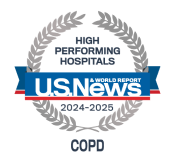COPD Symptoms and Triggers

Symptoms of COPD often don't appear until after significant lung damage has occurred, and these symptoms usually worsen over time. Emphysema and chronic bronchitis are the two most common conditions that make up COPD.
For chronic bronchitis, the main symptom is a cough that you have at least three months to a year for two consecutive years. Emphysema involves slow damage to the air sacs in the lungs, which creates shallow, difficult breathing.
People with COPD are also likely to experience episodes called exacerbations, during which their symptoms become worse and persist for days.
COPD Complications
You are more susceptible to illness and air quality issues and can acquire other diseases if you have COPD.
These illnesses can include:
- Respiratory infections: People with COPD are more susceptible to colds, the flu and pneumonia. Any respiratory infection can make it much more difficult to breathe and produce further damage to the lung tissue. An annual flu vaccination and regular vaccination against pneumococcal pneumonia help prevent some infections.
- High blood pressure: COPD may cause high blood pressure in the arteries that bring blood to your lungs (pulmonary hypertension).
- Heart problems: For reasons that aren't fully understood, COPD increases your risk of heart disease, including heart attack.
Learn more about COPD symptoms and triggers.
-
Find a lung specialist in your area.

